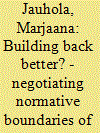| Srl | Item |
| 1 |
ID:
093780


|
|
|
|
|
| Publication |
2010.
|
| Summary/Abstract |
This article focuses on gender mainstreaming policies and advocacy on gender equality in the post-tsunami context in Nanggroe Aceh Darussalam. Through the analysis, this article illustrates how gender mainstreaming policy documents and gender advocacy of the provincial and central government, when drawing from sex/gender division and binary of genders, reproduce heteronormative boundaries. By focusing on details, I argue that the image of the heteronormative nuclear family participates in normalising other identity categories; such as urban and middle-class. I also provide examples of how simultaneous to the production of dominant norms, gender advocacy challenges heteronormativity and norms governing heterosexuality and actively question the dominant gender norms. Drawing from postcolonial feminist and recent queer critiques, I argue that advocacy that solely focuses on gender and/or sexuality reduces human bodies and their desires to simplistic stick figures. Thus, it remains blind to other forms of violence, such as global economic and political frameworks that define 'building back better' primarily as recovery and rehabilitation of economy, assets and labour force.
|
|
|
|
|
|
|
|
|
|
|
|
|
|
|
|
| 2 |
ID:
145277


|
|
|
|
|
| Summary/Abstract |
This article interrogates the sexual ideology of Finnish peacebuilding, the country's foreign policy brand and the Women, Peace and Security (WPS) agenda by examining the experiences of women ‘written out of history’. Using the method of ‘writing back’ I juxtapose the construction of a gender-friendly global peacebuilder identity with experiences in Finland after the Lapland War (1944–45) and in post-conflict Aceh, Indonesia (1976–2005). Although being divided temporarily and geographically, these two contexts form an intimate part of the abjected and invisible part of the Finnish WPS agenda, revealing a number of colonial and violent overtones of postwar reconstruction: economic and political postwar dystopia of Skolt Sámi and neglect of Acehnese women's experiences in branding the peace settlement and its implementation as a success. Jointly they critique and challenge both the gender/women-friendly peacebuilder identity construction of Finland and locate the sexual ideology of WPS to that of political economy and post-conflict political, legal and economic reforms. The article illustrates how the Finnish foreign policy brand has constructed the country as a global problem-solver and peacemaker, drawing on the heteronormative myth of already achieved gender equality on the one hand and, on the other, tamed asexual female subjectivity: the ‘good woman’ as peacebuilder or victim of violence. By drawing attention to violent effects of the global WPS agenda demanding decolonialization, I suggest that the real success of the WPS agenda should be evaluated by those who have been ‘written out’.
|
|
|
|
|
|
|
|
|
|
|
|
|
|
|
|